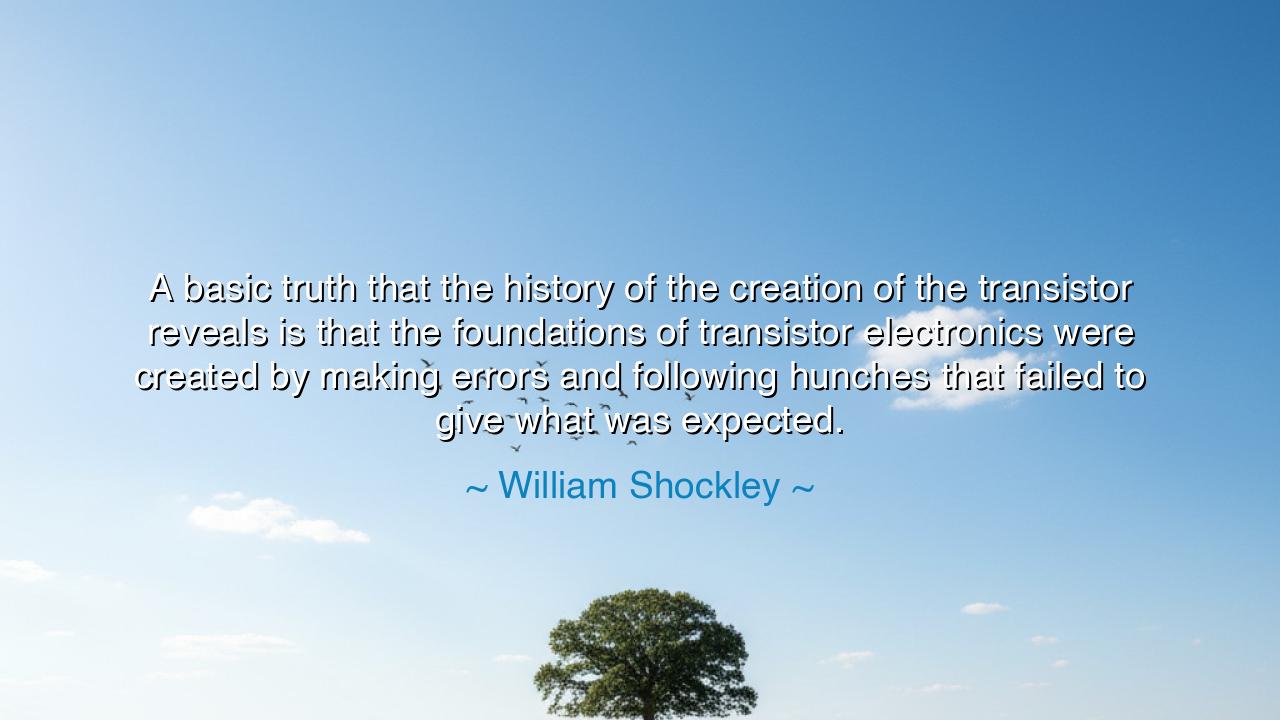
A basic truth that the history of the creation of the transistor
A basic truth that the history of the creation of the transistor reveals is that the foundations of transistor electronics were created by making errors and following hunches that failed to give what was expected.






Hearken, O seekers of knowledge and architects of innovation, and lend your hearts to the words of William Shockley, who spoke of the hidden truths behind human discovery: “A basic truth that the history of the creation of the transistor reveals is that the foundations of transistor electronics were created by making errors and following hunches that failed to give what was expected.” In these words lies a meditation upon the nature of invention, the value of failure, and the profound lesson that progress is rarely born of certainty, but of perseverance through trial, error, and daring intuition.
The history of the transistor, that marvel which would reshape the very fabric of human life, is a testament to the courage of those who dared to explore the unknown. Shockley, along with John Bardeen and Walter Brattain at Bell Labs, embarked upon an endeavor guided as much by curiosity and instinct as by theory. The path was strewn with experiments that failed, models that faltered, and hypotheses that led to dead ends. Yet it was through these apparent failures that the principles of semiconductor physics were illuminated, giving rise to the revolution in electronics and communication that now defines our age.
Consider the countless prototypes, the days and nights spent with materials that refused to behave, the electrons that defied expectation. Each failure was not a defeat, but a revelation: a hint, a signpost pointing toward deeper understanding. Shockley’s reflection emphasizes that the foundation of innovation is often constructed upon missteps and unfulfilled expectations. Without the courage to pursue hunches that may falter, the brilliance of discovery would remain forever unseen, trapped in the shadows of human timidity.
This truth extends beyond the realm of physics. In every field of human endeavor, progress emerges from perseverance, from the willingness to confront error and to learn from it. Thomas Edison’s countless attempts to perfect the electric light are a vivid echo of this lesson. Thousands of filaments failed before one succeeded, and Edison’s famous response, that he had not failed but found thousands of ways that would not work, mirrors Shockley’s insight: failure is the crucible in which knowledge and achievement are forged.
The teaching here is profound: do not fear missteps, for they are as essential to learning as success itself. Innovation requires a mindset attuned not merely to outcomes, but to observation, reflection, and adaptation. Each hunch, each experiment, whether yielding the expected or the unexpected, contributes to the tapestry of understanding. It is in embracing uncertainty, in daring to act despite incomplete knowledge, that humanity expands the boundaries of what is possible.
Shockley’s words also illuminate the moral dimension of intellectual pursuit. To fear error is to stagnate; to celebrate only immediate success is to deny the journey of discovery. The creation of the transistor teaches that humility and patience are as vital as brilliance, for understanding is cumulative, built upon countless trials, many unseen, many forgotten, but each essential. Progress, therefore, is not a single triumph but a chorus of efforts, some celebrated, some obscure, all necessary.
From this insight emerges practical guidance: act boldly, experiment freely, and regard failure as a teacher rather than a foe. Approach challenges with both imagination and rigor, record your observations diligently, and let curiosity guide your hunches. Whether in science, art, or daily life, the willingness to confront uncertainty and to learn from missteps is the hallmark of true wisdom and ingenuity.
Thus, remember: the creation of the transistor is more than a technical milestone—it is a lesson for every soul who dares to innovate. William Shockley’s words remind us that knowledge is forged through trial, error, and intuition, and that the path to achievement is never straight or certain. Embrace failure as a guide, act upon insight even when unproven, and in doing so, contribute to the enduring march of human discovery. The history of innovation is written by those who persist, guided by curiosity, and unafraid to follow hunches that may, at first, fail.
If you wish, I can also craft a more dramatic, audio-ready version, vividly narrating the experiments at Bell Labs, Shockley’s struggles and triumphs, and the birth of the transistor to make the story even more compelling for listeners. Do you want me to do that next?






AAdministratorAdministrator
Welcome, honored guests. Please leave a comment, we will respond soon